Bolshoi Theater at Lincoln Center Festival 2014
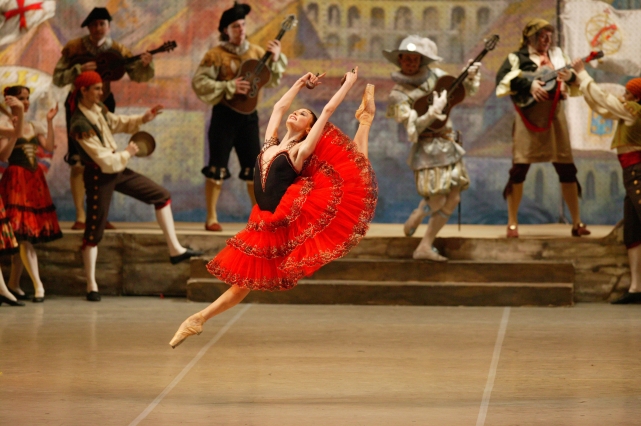
Svetlana Zakharova in Bolshoi Ballet's production of Don Quixot. Source: Damir Yusupov-Bolshoi Theatre
For the first time in the celebrated company’s history, the combined forces of the Bolshoi Ballet, Opera, Orchestra, and Chorus will perform in New York with ballet and opera-in-concert repertory that showcases the depth and range of their artistic tradition.
The Bolshoi Ballet (Sergei Filin, Artistic Director) plans to bring dancers Svetlana Zakharova, David Hallberg, Maria Alexandrova, Ekaterina Shipulina, Vladislav Lantratov, Olga Smirnova, Ekaterina Krysanova, Anna Nikulina, Maria Vinogradova, Mikhail Lobukhin, Ruslan Skvortsov, Artem Ovcharenko and Denis Rodkin for the engagement of three evening-length ballets in the David H. Koch Theater: Alexei Fadeyechev’s 1999 production ofDon Quixote, based on choreography by Marius Petipa and Alexander Gorsky; Yuri Grigorovich’s 2001 production of Swan Lake, one of the company’s defining works; and Grigorovich’s 1968 grand spectacle, Spartacus.
The Bolshoi Ballet’s last Lincoln Center Festival appearance was in 2000.
In addition, the Bolshoi Opera, Orchestra and Chorus will perform for the first time in New York, giving two performances of a concert version of Rimsky-Korsakov’s opera rarity, The Tsar’s Bride, in Avery Fisher Hall. The ensemble includes singers Anna Aglatova, Dinara Alieva, Svetlana Shilova, Elena Manistina, Vyacheslav Pochapsky, Stanislav Trofimov, Elchin Azizov, Maksim Yasnopolsky, Oleg Tsybulko, Mikhail Gubsky, Boris Rudak, Stanislav Mostovoy, Marat Gali, Irina Udalova, Elena Novak, Pavel Valuzhin, Anna Matsey, and Sophia Kriklenko.
Programs and artists subject to change.
For more information and tickets visit the web-site.
The Bolshoi Ballet and Orchestra
July 15-27, 2014
13 performances, David H. Koch Theater(Broadway at 63rd Street)
July 15, 16, 17, 18 at 8 pm; July 19 at 2 and 8 pm; July 20 at 2 pm: Swan Lake
July 22 at 8 pm; July 23 at 2 and 8 pm: Don Quixote
July 25 and 26 at 8 pm; July 27 at 2 pm: Spartacus
Swan Lake
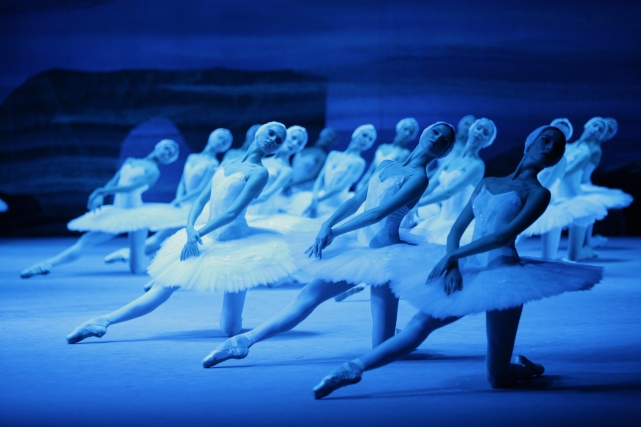
Bolshoi Ballet's production of Swan Lake which will be presented as part of Lincoln Center Festival 2014. Source: Damir Yusupov-Bolshoi Theatre
Tchaikovsky’s beloved and timeless ballet classic was originally choreographed by Julius Reisinger and premiered by the Bolshoi Ballet in 1877 at the Bolshoi Theatre, where it was billed as The Lake of the Swans. Most ballet companies base their productions on the 1895 revival by Marius Petipa and Lev Ivanov.
The Bolshoi’s production of Swan Lake, presented in two acts, has choreography and book by Yuri Grigorovich (the 2001 version) with story elements by Vladimir Begichev and Vasily Geltser; the production incorporates choreography by Marius Petipa, Lev Ivanov, and Alexander Gorsky.
The familiar story of Swan Lake was inspired by Russian and German folktales. Russian ballet patriarch Fyodor Lopukhov calls Swan Lake “a national ballet” because its swans originate from Russian romantic sources. “The plot, the image of the swan, and the very idea of a faithful love are essentially Russian,” he says.
Running time: two hours, 15 minutes, with one intermission.
Don Quixote
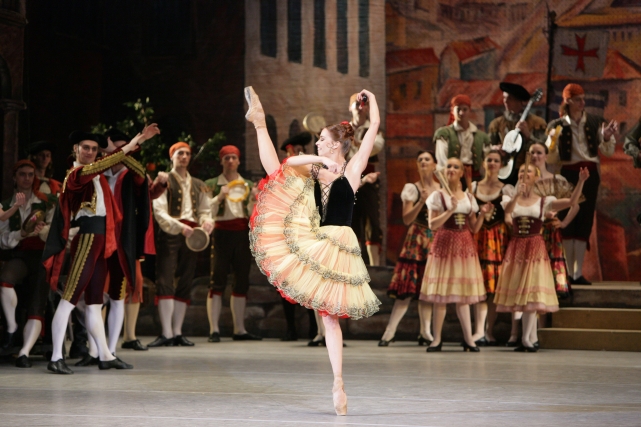
Ekaterina Krysanova in Bolshoi Ballet's production of Don Quixote which will be presented as part of Lincoln Center Festival 2014. Source: Damir Yusupov-Bolshoi Theatre
A thrilling spectacle of classical dance that was first performed by the company at the Bolshoi Theatre in Moscow in 1869, Don Quixote, is a ballet in three acts with a libretto by Marius Petipa, who also created the original choreography, after the novel of the same name by Miguel de Cervantes. The music is by Ludwig Minkus, who composed over twenty ballets and was the official ballet composer at the Bolshoi Theatre in Moscow from 1864-1871.
At Lincoln Center Festival the company will perform the “robust and colourful” (The Daily Telegraph, London) 1999 version choreographed by Alexei Fadeyechev, based on Petipa’s original 1869 choreography and Alexander Gorsky’s revisions in 1900. In a program note, Fadeyechev has said, “The ballet company that can give a good performance of Don Quixote has earned the right to dance almost anything.” A jewel in the crown of the company’s repertory, with glorious costumes and sets that spotlight the ballet’s choreographic pyrotechnics, the full company features more than 20 solo dancing and character roles.
Running time: two hours, 35 minutes, with two intermissions
Spartacus
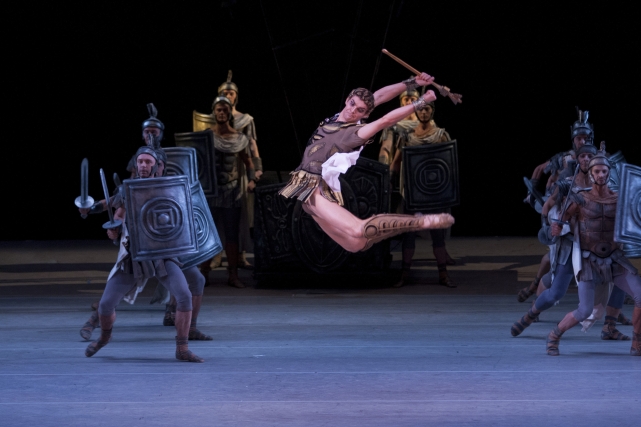
Alexander Volchkov as Crassus in Bolshoi Ballet's production of Spartacus which will be presented as part of Lincoln Center Festival 2014. Source: Elena Fetisova-Bolshoi Theatre
A spectacle of grand scale, a thrilling combination of physical power and drama that demands virtuosity from the dancer in its title role, Spartacus has been one of the Bolshoi’s signature works for nearly 50 years. With stirring music by the great 20th century Soviet-Armenian composer, Aram Khachaturian and choreography by Yuri Grigorovich, artistic director of the Bolshoi Ballet from 1964 to 1995, this ballet in three acts tells the tragic story of Spartacus, a brave Thracian gladiator who unsuccessfully led a slave revolt against the Roman Empire in the first century BC. The Soviet leadership championed this saga of a hero who is martyred in the pursuit of freedom from imperial tyranny, and the company toured widely with it abroad during the Soviet era and up to the present.
Yuri Grigorovich had been choreographer-in-chief for the Bolshoi Theater for four years when his 1968 production of Spartacus, the balletic equivalent of a Hollywood epic, with scenes that feature the massing of the Roman army, a Roman orgy, and the death of the hero, premiered. It surpassed previous productions of the ballet by other choreographers and became his first major success with the company, establishing his reputation as a choreographer. The libretto was based on the 1874 novel of the same name by Raffaello Giovagnolli, with additional material by Nikolai Volkov. The great Vladimir Vasiliev created the title role, and came to embody the strong Bolshoi male dancer in the popular imagination.
Running time: two hours, 45 minutes, with two intermissions
The Bolshoi Opera, Orchestra, and Chorus
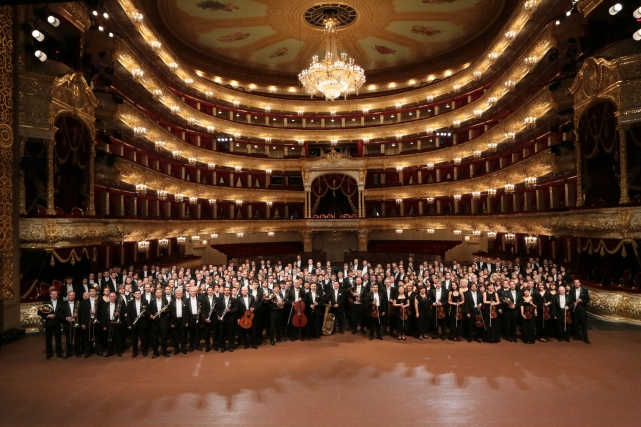
Bolshoi Orchestra will perform as part of Lincoln Center Festival 2014. Source: Damir Yusupov
The Tsar’s Bride
Opera in four acts in concert, sung in Russian with English supertitles
July 12 and 13, 2014
2 performances, Avery Fisher Hall(Broadway at 64th Street)
The weekend before the start of performances by the Bolshoi Ballet at the Festival, the Bolshoi Opera will present Rimsky-Korsakov’s beloved Russian classic 1899 opera, The Tsar’s Bride, in concert for two performances in Avery Fisher Hall. Rarely-performed in the West, but a popular favorite in Russia, it is a fantastical tale that speculates on a single mysterious event during the long reign of 16th century Tsar Ivan IV (Ivan the Terrible), whose third wife, Marfa, died just days after their wedding. The ninth of the composer’s 15 operas, it is a complex psychological drama, one that leans heavily on a lyrical, almost Italian style of vocal writing. One beautiful example is the second act aria that introduces Marfa.
The beautiful daughter of a merchant, Marfa is idolized by two men. One is her fiancé and childhood sweetheart, Ivan Lykov; the other is one of the Tsar’s bodyguards, Gryaznoy, who has tired of his longtime mistress, Lyubasha. Gryaznoy acquires a love potion, hoping to seduce Marfa. Meanwhile, Lyubasha, overhearing his plans, gets another potion, one that will poison her rival. At the same time, the Tsar (who never actually appears in the opera) has decided to take a wife, and from a field of 2000 women, he selects the beleaguered Marfa.
Familiar to many music lovers for his brilliantly orchestrated concert music, Rimsky-Korsakov based many of his operas on stories from Russian folklore and legend. Along with the so-called other “Mighty Five” composers of his time—Alexander Borodin, César Cui, Mily Balakirev, and Modest Mussorgsky— his goal was to establish a distinctly Russian school of composing, and Russian history was one of their most important tools.
Running time: approximately three hours with intermission
All rights reserved by Rossiyskaya Gazeta.
Subscribe
to our newsletter!
Get the week's best stories straight to your inbox